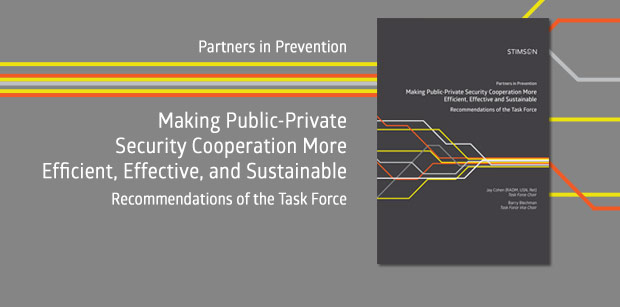Partners in Prevention works with industry to facilitate pragmatic, market-based steps to ensure that profitability and public security are mutually reinforcing goals in global business operations.
For the 2014 Task Force recommendations, please click here. For background on Task Force members, please click here.
Background
Every day, legitimate businesses that form the physical and financial backbones of our global economy are unwittingly co-opted as key enablers for the development, production, or movement of a broad array of contraband, from narcotics and counterfeit goods to dual-use WMD technologies. The implications are severe for states and the business community alike. For governments, trafficking impacts customs collection, feeds corruption, and generally empowers criminal elements at the expense of state institutions and public security. For industry, mounting global competitiveness and uneven regulation directly challenge the prime motivation of firms: profit. This has helped breed a culture of compliance with the letter of the law over public-private problem-solving with mutual benefit.
Developing better government-industry collaboration at national, regional, and international levels is essential for a modernized security strategy. Rather than reflexively mandating new controls through legislation or regulatory directives, a complementary effort to engage relevant businesses, develop templates for self-regulation, and establish market-based incentives to do so, would better promote security and prosperity. While not a cure-all for trafficking challenges, this approach would go far to supplement reasonable government education, regulation, and enforcement, fundamentally restricting the number of weak links in global supply chains.
Project Goals
Partners in Prevention facilitates market-based integration of the private sector into security approaches by engaging three industry spaces that figure prominently in global value chains: dual-use technology manufacturers (security and defense), shipping and logistics firms, and insurance providers. The project identifies industry interests, capabilities, and responsibilities in preventing the global movement of contraband and sought innovative solutions that address both the security and profit imperatives. With the assistance of a senior-level Task Force and industry-specific Working Groups, the project had two core objectives:
• Enhanced information flows between the private sector and government in support of identifying and preventing illicit activities; and
• Development of new mechanisms for industry self-regulation consistent with government security needs.
You can learn more on our FAQ page.
Key Principles
Partners in Prevention examines some of the world’s most economically and politically complex market and security environments. From contraband WMD items and narcotics smuggled through Iran, to counterfeit Chinese pharmaceuticals and electronics covertly placed among legitimate goods and onto store shelves in America, to humans packed into shipping containers and forced into menial labor and prostitution in Europe, criminal exploitations of global supply chains vary widely. Yet they are deeply interrelated in criminal business practices. So while there can be no “one-size-fits-all” solution to these challenges, the project aims to unpack some of the common building blocks for mutually beneficial government-industry collaboration—starting with these three principles, unanimously endorsed by the Task Force.
• Public-private collaborations must be responsive to market characteristics and security gaps. Even when modeled on past successes, static, formulaic approaches will not keep pace with today’s economic and security dynamics. The key to mutually beneficial collaboration is a flexible process and incentive structure that satisfies the economic concerns of industry and the regulatory concerns of government. Market forces, in themselves, are not a panacea. Respect for proprietary business operations and the profit motive must be balanced with sufficient transparency for oversight in service of security challenges.
• Information sharing must be an ongoing priority. Properly calibrating the roles and responsibilities of government and private sector actors depends on an institutionalized information-sharing framework that benefits both constituencies. Moreover, when effective public-private collaborations already exist, new initiatives should strengthen and complement them rather than duplicating effort.
• Security and profitability can be mutually reinforcing goals. Companies can maintain existing advantages and unlock new market opportunities by improving security within their organizations and respective industries, and by contributing to the security and resilience of the wider global trading and financial systems.
Get Involved
For more information on Partners in Prevention, please contact:
Brian Finlay (President and CEO, Stimson Center): [email protected]
Nate Olson (Trade 21 Director, Stimson Center ): [email protected]
You can also learn more on our FAQ page.

